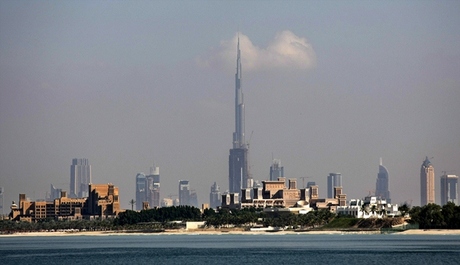UAE-U.S. Ties Facing Stress Test over Ukraine War

The United Arab Emirates and the United States are facing a "stress test" in their relationship, a senior Emirati diplomat said Thursday, as Russia's war in Ukraine strains ties.
Yousef al-Otaiba, the Emirati ambassador to the U.S., was speaking days after the UAE abstained in a U.N. Security Council vote on a resolution demanding a Russian withdrawal from Ukraine.
"Our relationship with the U.S. is like any relationship," he told the International Defense Industry, Technology and Security Conference in Abu Dhabi.
"It has strong days where the relationship is very healthy, and days where the relationship is under question.
"Today, we're going through a stress test, but I'm confident that we will get out of it and we will get to a better place," Otaiba added.
The wealthy Gulf state hosts US troops and has been a strategic partner to Washington for decades, but its economic and political ties with Russia are growing.
The UAE, which currently holds the U.N. Security Council presidency, on Friday abstained from voting on a U.S.-Albanian draft resolution condemning Russia's invasion of Ukraine.
Three days later, the Security Council voted to extend an arms embargo to all of Yemen's Iran-backed Huthi rebels.
After Russia, which is close to Iran, voted in favor of the UAE-supported resolution, diplomats suggested a deal was cut between Moscow and Abu Dhabi.
- Sky-rocketing oil prices -
The Gulf state has also shown no interest in increasing oil production after prices were sent sky-rocketing by the Russian invasion, saying it remains committed to the OPEC+ alliance, which is led by Saudi Arabia and Russia and controls output levels.
The recent developments come after U.S. forces fired Patriot interceptors to help thwart a Huthi missile attack on Abu Dhabi in January. Three oil workers were killed in an earlier attack.
In December, the UAE threatened to scrap its mega-purchase of U.S. F-35 fighter jets, protesting stringent conditions set by Washington over concerns on China.
UAE ties with the U.S. had warmed under former president Donald Trump, after a cooler period during Barack Obama's tenure.
But President Joe Biden, who was Obama's vice-president, quickly shifted back to a somewhat tougher stance on human rights and arms deals.
He also reopened negotiations with Iran, long accused by Gulf states of creating regional chaos.
Otaiba said the UAE's focus has shifted to "partnering" with big economies such as the US in areas such as defense and technology, rather than just "buying."
"I think it's fair to say that 10, 20 years ago, the UAE was considered or viewed as a traditional buyer of advanced technology," he said.
"Today, in 2022, I think that that framework is not still the same. I think today we are more of a developer... We're not interested in just buying. We're interested in partnering."



